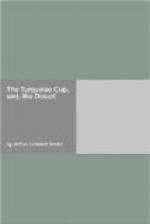“I ask you now,” said Abdullah.
Ali bowed. “Master,” he answered, “the house is occupied by Ilderhim, chief of the tribe of Ouled Nail. He hires it for five years, and he occupies it for the three months, Chaban, Ramadan, and Chaoual, of each year. He has also the gardens and four water-rights. He deals in ivory, gold-dust, and dancing-girls. He formerly lived in Biskra, but the French banished him. They have also banished him from Algiers, and he has been warned from Cairo and Medina. He has a divorced wife in each of those cities. They are the mothers of the dancing-girls. The one in Biskra is Mirza. Every one in Biskra knows Mirza. Doubtless you, master—”
“Yes,” said Abdullah, “but the damsel. Who is she?”
“His daughter,” replied Ali.
“How know you this?” demanded Abdullah, fiercely.
“Master,” said Ali, “last night, when you were looking at the stars with the mistress, I had a word with the maid. She came to me, while I was asleep by the dun leader, and shook me as if I had been an old friend.
“‘Save her,’ she whispered, as I rubbed my eyes.
“‘Willingly,’ I replied. ‘Who is she?’
“‘My mistress,’ said the maid. ’They are taking her to Biskra. She has been sold to Mirza. She will dance in the cafes. This sweet flower will be cast into the mire of the market-place. Save her.’
“‘How know you this?’ I asked.
“‘Ah,’ she answered, ’this is not the first time I have crossed the desert with one of Ilderhim’s daughters. Save her.’
“’Does the damsel know nothing of this—does she not go with her eyes open?’ I asked.
“‘She thinks,’ said the maid, ’that she goes to Biskra to be taught the manners and the learning of the French women—to read, to sing, to know the world. Her heart is even fairer than her face. She knows no evil. Save her.’”
Abdullah groaned and hung his head.
“Forgive me, Allah,” he said, “for that I doubted her. Forgive me for that I burned the flowers she gave to me,” and he went out.
“Your coffee, master,” cried Ali, but Abdullah paid no heed. He went swiftly to the little tent, and there was the damsel, veiled, and already mounted on the lame camel, ready to march.
“Beloved,” said Abdullah, “you must dismount,” and he lifted her from the back of the kneeling beast.
“Ali,” he cried, “place the damsel’s saddle on the black racer, and put mine on the dun. We two start on at once for the oasis of Zama. We can make it in thirteen hours. Give us a small water-skin and some dates. I leave everything else with you. Load, and follow us. We will wait for you at Zama. I go to counsel with the Man who Keeps Goats.”
In five minutes the black racer and the dun leader were saddled.
“Come, beloved,” said Abdullah, and without a word she followed him. She had asked no question, exhibited no curiosity. It was enough for her that Abdullah said, “Come.”




